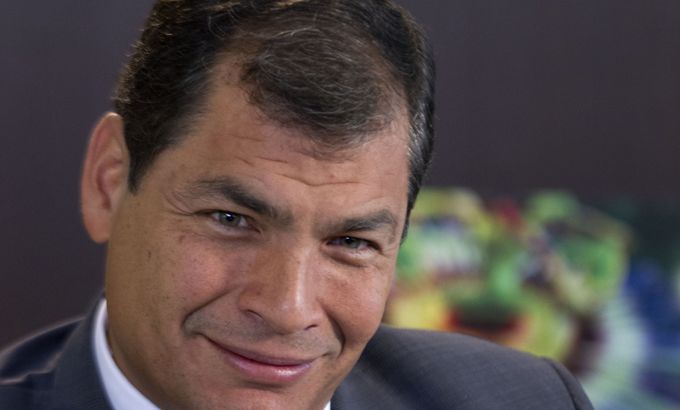
Rafael Correa: ‘Our right to grant asylum’
The president of Ecuador discusses whistleblower Edward Snowden’s attempt to seek political asylum in his country.
Ecuador, a tiny South American nation, has found itself at the centre of an international dispute.
Edward Snowden, the National Security Agency consultant-turned whistleblower, has asked President Rafael Correa for political asylum. Snowden is still in Russia evading an arrest warrant issued by the United States.
One year ago, Ecuador opened the doors of its embassy in London to Wikileaks founder Julian Assange so that he could avoid trial in Sweden and possible extradition to the US.
Every human being, every citizen has the right to request asylum under the declaration of human rights, under inter-American legislation, under our constitution or our law on foreigners. Snowden has the right to request asylum and it's our country's sovereign right to grant asylum or not. When the time comes we will decide.
Ecuador’s centre-left President Rafael Correa says the same legal process will be applied before any decision on Snowden’s case. He has vowed to fight any type of international pressure, especially from Washington.
Correa has renounced to the Andean Trade Promotion and Drug Erradication Act between Ecuador and the US. The agreement allowed some Ecuadoran products like flowers and vegetables to enter the US with reduced import tariffs. Ecuador says that Washington is using trade agreements to try to force Latin American nations to its will.
But many in Ecuador disagree with the government’s decisions – Ecuador’s flower industry is a vital part of the agricultural sector. Another problem is that the US dollar is Ecuador’s official currency, so Ecuador relies on exports to get the money to use at home.
Since Rafael Correa took office in 2007 his relations with Washington have been tense.
While less confrontational than Venezuela’s President Hugo Chavez, Correa has a history of standing up to the US. In 2009, he threw out a US military base in Manta and high-ranking diplomats. In 2011, he declared the US ambassador persona non-grata after Wikileaks published a cable alleging corruption. And last year, he took in the founder of Wikileaks, Julian Assange.
Christian Zurita has already been on trial twice for writing a book that linked Correa’s brother to a corruption scandal. He says what is happening to him is an example of the serious threats that journalists face in Ecuador.
“I understand that Assange and Snowden are requesting political asylum to Ecuador. The fact that Snowden could come here is a good thing because the world will find out what the government is trying to do here. They are persecuting the press and journalists … For everything you write from now the government can come after you,” Zurita says.
But Correa’s supporters disagree and some journalists say the accusations are unfair – that the new law will give journalists rights that they had never had before.
Correa remains defiant and is slowly gaining force as a regional leader that is not afraid to poke the US in the eye every once in a while. He was recently reelected with almost 57 percent of the vote.
We met Correa last week in the town of Porto Viejo. And although Snowden’s situation continues to change almost every day he explained to Talk to Al Jazeera why he believes Ecuador could grant Snowden asylum if he were to make it to his country’s territory and why he believes that people like Assange and Snowden have done society a greater good.
 | Talk to Al Jazeera can be seen each week at the following times GMT: Saturday: 0430; Sunday: 0830, 1930; and Monday: 1430.
Click here for more Talk to Al Jazeera |